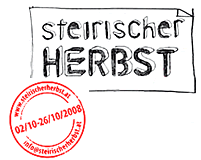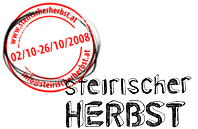Workshop I
Why we don’t do what we really want to do.
But are nevertheless actors
06/10 - 11/10/2008
By Gesa Ziemer (CH/D)
With Tony Chakar (RL), Scott Lash (GB),
geheimagentur / Club der Autonomen Astronauten (Fundus Theater) (D)
& Claus Pias (A/D)
In English language
“Every group, no matter how large or small, needs a limes like
the mythical one that Romulus drew around emerging Rome.”
Bruno Latour
For some time now, people have been diagnosing a crisis of action.
Briefly, this crisis is due to the fact that the sovereign,
autonomously acting subject has begun to question itself. At the same
time, the effectiveness of its actions is questioned by complex outer
processes. How should we act sensibly as individuals in terms of
ecology? Can we influence technological developments or globalisation
as individuals? Such questions illustrate how small our scope for
action usually is. They also show that familiar social affiliations
such as families, parties or nations, in which we act, are crumbling.
In this workshop therefore unpredictable but nevertheless productive
inherent dynamisms and efficacies of groups will be discussed. For when
we act we are usually not alone. We act in formations and create new
ones – even if they are only very small. We are actors in networks,
swarms, complicities, we form gatherings or teams. In most cases,
action – be it conceived as individual or collective – does not seem to
be subject to the full control of our consciousness. ###
Often we do not
know why we do something and do not do something else. Still we are constantly ‘committers’ or – to put it less dramatically – actors. What
could being an actor mean today? Debates regarding the notion of agency
are helpful in this regard: it means something like action, but also
effectiveness. Agency may indicate that not only autonomous human
beings act but also non-human beings (Bruno Latour). Let us imagine an
“imaginary supermarket of social links” in which objects, for example,
also interact with each other. Let us try to envisage new social
interactions with the aid of an associative approach.
The focus is on aspects of perception and movement in group formation,
that are of equal relevance in art and theory. Rhythm, speed, direction
or intensity of movement often decide as to the success or failure of
group formations. With guests from these fields we will discuss
approaches in theory and in art, taking a look at concrete examples in
the festival, and engaging in practical experiments. Can a (moving)
theory of small groups become a new practice of action?
Together we will start our working
method of reformulation based on the already individually collected
material. In a circular structure we initiate processes of formulation,
rendering, reformulation, passing on and giving up. In the end we will
come up with individual projects without a fixed authorship that can be
worked out further. The idea of giving up and passing on is a central
concept of our workshops. The participants experience through the
giving up of authorship a possible difference of individual and shared
reference within the frame of always also socially sharable and
communicatable aesthetical processes. Gesa Ziemer
Co-produced by NXTSTP, with the support of the Culture Programme of the European Union
On 11/10/2008, the workshop will be taking part in the steirischer
herbst “Walking Conference” on the topic of “Strategies for avoiding
misfortune” (with Isolde Charim, Scott Lash, Michaela ###
Ott, plan b and
many more).
Tony Chakar is an architect,
born in Beirut in 1968. His works includes: "A Window to the World":
Ashkal Alwan, Beirut (2005). "Various Small Fires": The Royal College
of Art, London (2007). "Memorial to the Iraq War": ICA, London, 2007.
Yesterday's Man: a play-performance with Rabih Mroué and Tiago
Rodrigues (2007); showing in several European cities. He also
contributes to Al Mulhaq (Annahar's cultural supplement) and other
European art magazines, and teaches History of Art and History of
Architecture at the Académie Libanaise des Beaux arts (ALBA), Beirut.
Scott Lash is a professor of
sociology and cultural studies at Goldsmiths College, University of
London. Lash's work has been particularly influential in sociology and
cultural studies. His work received a great deal of attention in
cultural geography. Books: “Recognition and Difference: Politics,
Identity, Multiculture” (co-ed. with M. Featherstone) London: Sage
(2002). “Global Culture Industry: The Mediation of Things”, Cambridge:
Polity (2005), contracted. co-author is C. Lury.
geheimagentur in co-operation with the
Club der autonomen Astronauten (Fundus Theater)
geheimagentur conducts its research in the realm of the extraordinary,
irregular or strictly odd: “Alibi-Agentur” (Thalia Theater Hamburg
2008), “Orakel der goldenen Wochen” (Kampnagel Hamburg 2008), “Casino
of Tricks” (Urbanfestival Zagreb 2007) - geheimagentur sets up
facilities and provokes situations that at first sight appear
fictitious, but which turn out to be surprisingly real.
(www.geheimagentur.net)
###
Claus Pias is professor for
epistemology and philosophy of digital media at the Institute of
Philosophy at Vienna University. Studied electrical engineering in
Aachen, art history, philosophy and German studies in
Bonn and Bochum. 2001-2006 Member of Junge Akademie at the
Berlin-Brandenburgische Akademie der Wissenschaften. 2006 Senior fellow
at Internationales Forschungszentrum Kulturwissenschaften (IFK) Vienna.
Focus of research: Philosophy of media and technology, media history of
science. Current research and projects: History and theory of computer
simulation, epistemic history of cybernetics, scaling as a technical
and philosophical problem, epistemology of the Cold War, Edition der
kritischen Schriften Hermann Bahrs (1863-1934)
Gesa Ziemer is professor for
cultural theory and aesthetics at Zurich University of the Arts.
Freelance curator of projects at the intersection of theory and
theatre. Currently visiting professor/lecturer at HafenCity University
Hamburg for urban development and F+F (Schule für Kunst und
Mediendesign Zürich) for the theory of images. Publications in various
media, including the following: Verletzbare Orte. Entwurf einer
praktischen Ästhetik. Berlin/Zürich 2008. Film: Komplizenschaften (with
Barbara Weber) 2007.
»Download application form
»herbst Academy: Invitation

